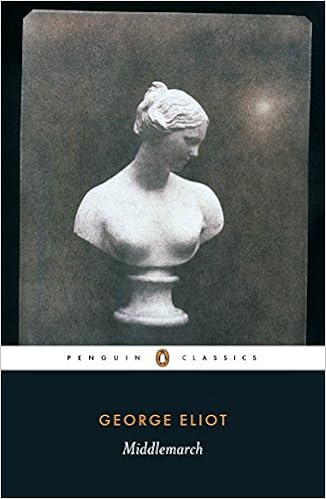
I read The Mill on the Floss by George Eliot when I was about 17 years old. I remember the experience because I almost literally could not put the book down. I read for 14 hours straight until I finished the book. I even remember cooking pork chops with one hand while holding the book in the other hand so that I could read while I cooked. I cannot tell you now what the book was about (that was almost 40 years ago), just that I loved it and devoured it, along with the pork chops:-). After reading Middlemarch, I plan to reread The Mill on the Floss and read all her other novels as well.
I loved Middlemarch, but I didn’t devour it. I chewed it slowly - the writing too beautiful to swallow whole. It grabbed me right from the start and I knew I was in for a sublime reading experience.
In many of the reviews I have read people have mentioned that Eliot’s narrative voice was not to their liking, finding it too didactic or distracting. I found her narrative to be one of the things I liked best. It was through this technique that most of the wisdom and life lessons were imparted. The narrative became another character for me, seamlessly blended with the rest of the characters.
“We mortals, men and women, devour many a disappointment between breakfast and dinner-time; keep back the tears and look a little pale about the lips, and in answer to inquiries say, "Oh, nothing!" Pride helps us; and pride is not a bad thing when it only urges us to hide our own hurts--not to hurt others."
Her ability to sum up a character in one beautifully written paragraph is remarkable.
In describing Mr. Casaubon, one of the main characters, Eliot writes. “It is an uneasy lot at best, to be what we call highly taught and yet not to enjoy: to be present at this great spectacle of life and never to be liberated from a small hungry shivering self-- never to be fully possessed by the glory we behold, never to have our consciousness rapturously transformed into the vividness of a thought, the ardor of a passion, the energy of an action, but always to be scholarly and uninspired, ambitious and timid, scrupulous and dim-sighted.”
In talking about another character, Dr. Lydgate, she says. “Only those who know the supremacy of the intellectual life-- the life which has a seed of ennobling thought and purpose within it-- can understand the grief of one who falls from that serene activity into the absorbing soul- wasting struggle with worldly annoyances.”
Her dry wit and humor are scattered throughout the book like sparkling gems.
“Miserliness is a capital quality to run in families; it's the safe side for madness to dip on”.
"He has got no good red blood in his body," said Sir James. "No. Somebody put a drop under a magnifying-glass and it was all semicolons and parentheses," said Mrs. Cadwallader.
"Oh, tallish, dark, clever--talks well--rather a prig, I think." "I never can make out what you mean by a prig," said Rosamond. "A fellow who wants to show that he has opinions." "Why, my dear, doctors must have opinions," said Mrs. Vincy. "What are they there for else?" "Yes, mother, the opinions they are paid for. But a prig is a fellow who is always making you a present of his opinions."
“But Duty has a trick of behaving unexpectedly--something like a heavy friend whom we have amiably asked to visit us, and who breaks his leg within our gates.”
Eliot is sympathetic to her characters, showing the good and bad in all, even the characters who would be despised if written by most authors. There is no black and white here, and yet the story is still compelling without the devise of writing purely lovable or despicable characters. We are shown what motivates the most hateful figures as well as those we are drawn to, and as a result there is no one in this book with whom you cannot empathize in some way. Her writing is infused with penetrating insights into human nature without ever losing compassion and understanding for their frailties. This empathy for her characters, perhaps more than anything else, differentiates her writing from Dickens and Austen.
I now look forward to reading all her other novels, starting with her first one, Adam Bede. It should be interesting to see her progression from first novel to last. I had very few preconceived notions about Middlemarch before I read it and maybe that helped me to enjoy it all the more, but enjoy it I certainly did!
No comments:
Post a Comment